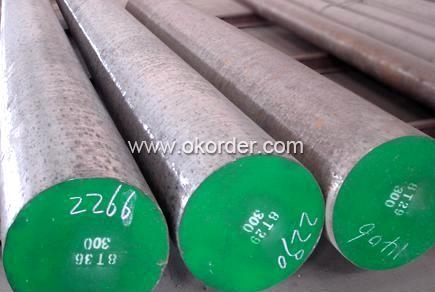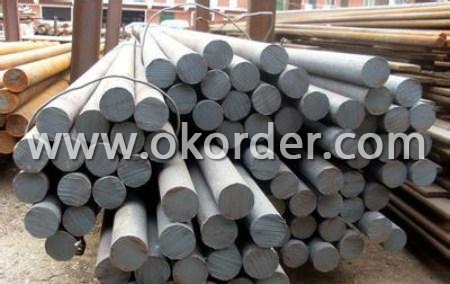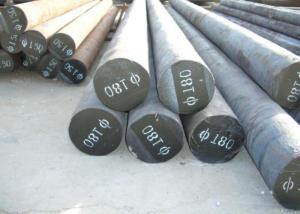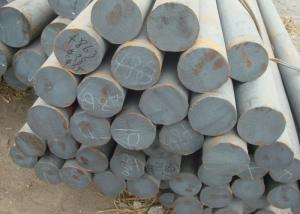Spring Steel 60Si2CrA
- Loading Port:
- China Main Port
- Payment Terms:
- TT or LC
- Min Order Qty:
- 50MT m.t.
- Supply Capability:
- 600000TONS/YEAR m.t./month
OKorder Service Pledge
OKorder Financial Service
You Might Also Like
Spring Steel:
Spring steel is divided into two types, one is alloy spring steel, and other one is carbon spring steel.
Alloy spring steel is a type that is used for manufacturing springs and other elastic parts. Spring steel should have high ratio of yield strength and tensile strength and elastic limit to make sure that the springs obtain enough power of elastic deformation and can bear much load.
Types of alloy spring steel: Si-Mn spring steel, Si-Cr spring steel, Cr-Mn Spring steel, Cr-V spring steel and so on.
Specification of Spring Steel 60Si2CrA
-Material: 60Si2CrA
-Standard: GB/T 1222-1984
-Type: Spring Steel
Corresponding Steel Grade for Reference:
CHN, GB | JPN, JIS | GER, DIN | GBR, BS |
60Si2CrA | SWOSC-V | 67SiCr5 | 685H57 |
USA, AISI/SAE/ASTM | ISO | ||
9254 | 55SiCr63 |
Chemical Composition:
C | Si | Mn | S |
0.52~0.60 | 1.5~2.00 | 0.60~0.90 | ≤0.035 |
P | Cr | Ni | Cu |
≤0.035 | ≤0.35 | ≤0.35 | ≤0.25 |
Mechanical Properties:
-Tensile Strength σb (MPa): ≥1274(130)
-Yield Strength σs (MPa): ≥1176(120)
-Elongation δ10(%): ≥6
-Percentage reduction of area: ψ (%): ≥30
-Hardness:
1, Hot rolled, ≤302HB
2, Cold drawn + Heat treatment: ≤321HB
-Norm of heat treatment: quenching 870℃±20℃
-Micro structure: Tempered troostite.
Usage/Applications of Spring Steel 60Si2CrA
-Compared with Si-Mn spring steel under the similar condition of plasticity, 60Si2CrA have higher tensile strength, yield strength and hardenability.
-60Si2CrA is applied for producing springs with working temperature below 300~500℃. This type of spring can bear high stress, for example, governor spring, turbine steam seal spring, etc…
Packaging & Delivery of Spring Steel 60Si2CrA:
-Packing Detail:
1, The products can be packed in bundles by steel wires.
2, The weight of each bundle no exceed normally 3 tons
-Marks: there are two types of marks. One is tag mark, for showing customers the specifications of products, company name and logo and other information required by customers. Other one is color marks. They are used to make the products more evident so that it’s easy for customers to distinguish them from other products at destination port.
-Delivery Detail: 30~45 working days after receive buyer’s T.T. or L/C.
Transportation:
-The products can be delivered by bulk vessel or by container. As for container, products with the length of 6m will be loaded in 20’ container, with 9m or 12m, in 40’ container.
-The maximum quantity of loading of container is 25 tons.
-The products are usually transported to the nearest port from the production place.
Payment:
-Invoicing on theoretical weight or actual weight as customer’s request.
-FOB, CFR or CIF.
-Terms of payment: T.T. or L/C at sight.
Photos of Spring Steel 60Si2CrA:


- Q:Can special steel be coated?
- Yes, special steel can be coated. Coating special steel provides several benefits such as corrosion resistance, improved aesthetics, increased durability, and enhanced functionality. There are various coating materials and techniques available for special steel, including but not limited to electroplating, hot-dip galvanizing, powder coating, and ceramic coating. These coatings help protect the steel from environmental factors, chemical exposure, and wear and tear, thereby extending its lifespan and maintaining its performance. Additionally, coatings can also be customized to provide specific properties like non-stick surfaces, heat resistance, or anti-microbial properties, depending on the intended application of the special steel.
- Q:How is special steel tested for quality and durability?
- Special steel is tested for quality and durability through a series of rigorous tests and inspections. These tests typically include measuring mechanical properties such as tensile strength, hardness, and impact resistance. Additionally, non-destructive testing methods like ultrasonic and magnetic particle inspections are used to detect any internal defects or inconsistencies. Quality and durability are ensured by adhering to strict industry standards and specifications, and only steel that meets the required criteria is deemed suitable for use.
- Q:How does special steel contribute to the food processing aftermarket industry?
- The food processing aftermarket industry greatly benefits from the use of special steel, as it offers a multitude of advantages that enhance overall efficiency, safety, and productivity. To begin with, special steel is renowned for its remarkable resistance to corrosion. This is particularly crucial in the food processing industry, where equipment frequently encounters acidic and corrosive substances. By utilizing special steel, machinery remains impervious to rust and contamination. As a result, the hygiene and quality standards of food processing operations are maintained, thereby reducing the risk of foodborne illnesses and contamination. Moreover, special steel exhibits exceptional strength and durability, enabling food processing equipment to withstand the demanding conditions of heavy usage and continuous operations. The robustness of special steel ensures the reliability of equipment, minimizing the likelihood of breakdowns or malfunctions during critical production processes. Consequently, operational efficiency is increased, downtime is reduced, and production output is improved. Furthermore, special steel can be customized to suit specific applications, allowing manufacturers to design and produce equipment that meets the unique requirements of the food processing industry. Special steel alloys can be tailored to possess specific properties, such as heat resistance, wear resistance, or hardness, depending on the specific processing needs. This adaptability guarantees that equipment can handle different types of food products, processing techniques, and operating conditions, resulting in enhanced versatility and adaptability within the food processing aftermarket industry. Additionally, special steel is compatible with various cleaning and sterilization processes, making it ideal for food processing equipment. The material can endure high-temperature cleaning methods, such as steam or chemical cleaning, without deteriorating or compromising its structural integrity. This ease of cleaning and sterilization contributes to maintaining the highest standards of hygiene and sanitation within the food processing industry. In conclusion, special steel's resistance to corrosion, strength, durability, customization options, and compatibility with cleaning processes make it an invaluable material within the food processing aftermarket industry. Its contribution to equipment reliability, hygiene, and productivity ensures that food processing operations can meet the stringent quality and safety standards required in this sector.
- Q:What is the role of special steel in the manufacturing of precision instruments?
- The manufacturing of precision instruments heavily relies on the use of special steel. Precision instruments, like watches, surgical tools, measuring devices, and aerospace components, necessitate materials with exceptional qualities such as durability, strength, resistance to corrosion, and dimensional stability. Special steel is specifically designed to meet these demanding requirements due to its unique composition and properties. One of the main advantages of special steel is its high level of purity and uniformity. It goes through extensive refining and purification processes to eliminate impurities, ensuring consistent and reliable performance. This purity is crucial in precision instruments as it minimizes the risk of contamination, which could result in inaccuracies or malfunctions. Another essential characteristic of special steel is its exceptional strength and hardness. Precision instruments often encounter high levels of stress, pressure, or mechanical forces without deforming or failing. Special steel, with its superior strength, provides the necessary structural integrity and stability to these instruments, enabling them to maintain their accuracy and reliability over time. Furthermore, special steel demonstrates excellent resistance to corrosion, which is vital for precision instruments that may come into contact with moisture, chemicals, or other corrosive substances. Corrosion can degrade the surface finish and compromise the functionality of the instruments. Special steel's corrosion resistance ensures that the instruments can withstand harsh environments and continue to perform accurately. Additionally, special steel is highly machinable and can be shaped into intricate components with precise tolerances. Precision instruments often require intricate designs and parts that demand high precision in the manufacturing process. Special steel's machinability allows for the production of these complex components with utmost precision, guaranteeing the overall accuracy and functionality of the instruments. In conclusion, special steel plays a crucial role in the manufacturing of precision instruments. Its purity, strength, resistance to corrosion, and machinability make it an ideal material for producing high-quality instruments that can provide precise measurements, withstand demanding conditions, and maintain their accuracy over time. Without special steel, the production of precision instruments with such exceptional qualities would be significantly compromised.
- Q:What are the different types of high-speed steel?
- There are several different types of high-speed steel, including M1, M2, M42, and T1. Each type has its own unique composition and properties, making them suitable for various applications in cutting tools, drills, and machining operations.
- Q:What are the different types of spring steel?
- There are several types of spring steel, including high carbon spring steel, alloy spring steel, stainless steel, and blue tempered spring steel. Each type has different properties and is used for various applications in industries such as automotive, construction, and manufacturing.
- Q:Can special steel be used in tool manufacturing?
- Tool manufacturing can utilize special steel, which falls under a distinct steel category possessing unique properties and characteristics suitable for various applications, including tool production. To enhance its strength, hardness, and wear resistance, special steel is often alloyed with elements like chromium, molybdenum, or vanadium. In the realm of tool manufacturing, special steel frequently finds use in the creation of cutting tools, drills, dies, molds, and other tooling components. Its exceptional strength and hardness allow it to endure the rigorous conditions encountered during cutting, drilling, and shaping diverse materials. Furthermore, special steel exhibits excellent resistance to wear, heat, and corrosion, making it an ideal choice for tools that require long-lasting sharpness and performance. Additionally, special steel can undergo further processing and treatment through techniques like quenching and tempering to achieve specific levels of hardness and enhance overall performance. This versatility positions special steel as the preferred material for tool manufacturers who prioritize durable, precise, and long-lasting products. All in all, special steel has established itself as a reliable and effective material in tool manufacturing, enabling the production of high-quality tools that satisfy the requirements of various industries, ranging from automotive and aerospace to construction and manufacturing.
- Q:How does special steel contribute to improving product resistance to environmental factors?
- Special steel contributes to improving product resistance to environmental factors in several ways. Firstly, special steel alloys are specifically designed to have enhanced corrosion resistance, which helps protect the product from rusting or deteriorating when exposed to moisture, chemicals, or harsh weather conditions. Additionally, special steel can have increased strength and hardness, making the product more durable and able to withstand mechanical stress or impacts caused by environmental factors. Moreover, some special steel alloys have excellent heat resistance, enabling the product to maintain its structural integrity and performance even at high temperatures. Overall, the unique properties of special steel make it an ideal material choice for enhancing product resistance to various environmental factors.
- Q:What are the properties of corrosion-resistant stainless steel?
- Corrosion-resistant stainless steel possesses a unique combination of properties that make it highly resistant to corrosion. These properties include a high level of chromium content, which forms a protective oxide layer on the surface of the steel, preventing further corrosion. Additionally, it has low carbon content, which further enhances its corrosion resistance. The presence of other alloying elements like nickel and molybdenum also contributes to its resistance against corrosion in various environments, making it suitable for a wide range of applications.
- Q:How does special steel contribute to the aerospace material weight reduction?
- Special steel contributes to aerospace material weight reduction through its unique properties and characteristics. Special steel alloys such as stainless steel, titanium alloys, and high-strength low-alloy steel offer superior strength-to-weight ratios, allowing for the construction of lightweight yet robust components and structures in aircraft. These steel alloys possess excellent mechanical properties, including high tensile strength, hardness, and corrosion resistance, which enables them to withstand extreme conditions and reduce the need for additional material reinforcement. By utilizing special steel, aerospace manufacturers can design and fabricate lighter aircraft, resulting in improved fuel efficiency, increased payload capacity, and enhanced overall performance.
1. Manufacturer Overview |
|
|---|---|
| Location | Jiangsu, China |
| Year Established | 1990 |
| Annual Output Value | Above US$ 20 Million |
| Main Markets | Mid East; Eastern Europe; North America |
| Company Certifications | |
2. Manufacturer Certificates |
|
|---|---|
| a) Certification Name | |
| Range | |
| Reference | |
| Validity Period | |
3. Manufacturer Capability |
|
|---|---|
| a)Trade Capacity | |
| Nearest Port | Shanghai |
| Export Percentage | 20% - 30% |
| No.of Employees in Trade Department | 21-50 People |
| Language Spoken: | English; Chinese |
| b)Factory Information | |
| Factory Size: | Above 100,000 square meters |
| No. of Production Lines | 1 |
| Contract Manufacturing | OEM Service Offered; |
| Product Price Range | High; Average |
Send your message to us
Spring Steel 60Si2CrA
- Loading Port:
- China Main Port
- Payment Terms:
- TT or LC
- Min Order Qty:
- 50MT m.t.
- Supply Capability:
- 600000TONS/YEAR m.t./month
OKorder Service Pledge
OKorder Financial Service
Similar products
New products
Hot products
Hot Searches
Related keywords






























